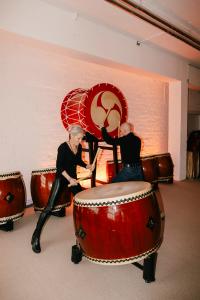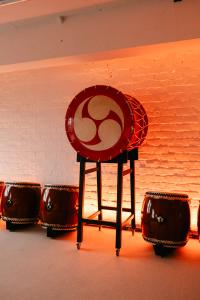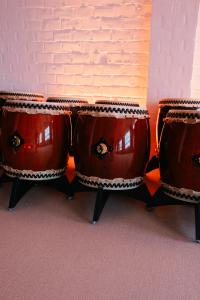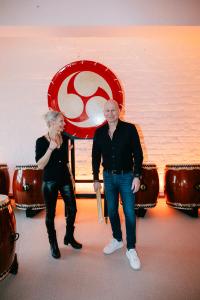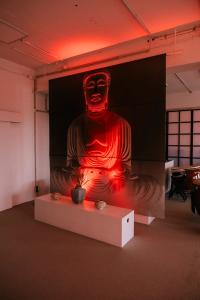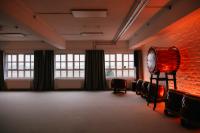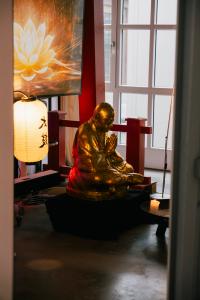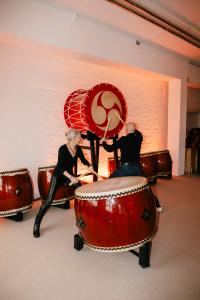Interview with Frank Dubberke and Jeannette Petersen
What do you do at WADOKYO?
Frank: We have developed Taiko into a tool - not only as a form of music, but also as a means of personal development and team building. We also offer retreats, both here at Areal Böhler and in Tuscany. Breathwork is another important element of our work. In short: everything that bundles energy, brings it to the centre and puts it into action from there. Resilience also plays a major role here - ultimately, our aim is to connect people and bring them into their power.
What exactly is Taiko?
Frank: It means getting to the heart of energy and focussing it - with full physical commitment. Unlike classical music, it's not about reading or playing notes. Taiko emerges from the body and unfolds through it. It's best to try it out for yourself - let's get to the drums!
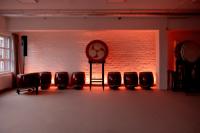
How did you get into taiko?
Jeannette: Through the music! Frank saw a taiko group in the Netherlands and was immediately hooked. There was nothing like that in Germany at the time. So we decided to build our own drums and get started.
Did you teach yourselves or did you learn somewhere?
Frank: We taught ourselves. Importing from Japan was too expensive and time-consuming, so we built our own drums. Originally that was a pragmatic solution - today we have 60 drums and travel all over Europe with them. We have already played at spectacular locations, such as the opening of the rowing track in Baku or at a hotel on the Palm in Dubai.
Do you also offer regular courses at Areal Böhler?
Frank: Yes, and the exciting thing is that we have developed our own learning system for this. We were able to pass on our knowledge through a trainer training programme. There are regular courses during the week and workshops at the weekend. We organise entire retreat weeks in Tuscany. Taiko is more than just music for us - it shows us a lot about people. We can recognise a lot about a person's personality just by the way they drum. And the beating of the drum has a liberating effect - it's a great channel for releasing energy and emotions.
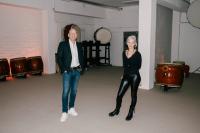
How long have you been doing this?
Jeannette: We are actually the ‘oldest tenants’ here at Areal Böhler - for 24 years, so since 2000. In the beginning, people travelled from all over Germany, Austria and Switzerland to get to know Taiko. Back then, it was still a niche topic. We initially had a small room with just one drum and one student. Today we have grown, the market has become bigger - but we have remained true to our philosophy.
Are there any competitors in Düsseldorf?
Jeannette: No, we are unique. While other groups are often just about pure taiko, we have developed our own system. We work integratively, which means we look at people as a whole - how they function, how consciousness works. We meet people where they are and connect them through taiko. That's what makes our method special.
Why did you choose Areal Böhler as your location?
Jeannette: The location is just perfect - close to the city, but not too hectic. Areal Böhler has developed really well and we feel very much at home here.
What would you like to see for the future of Areal Böhler?
Frank: The development is exciting! The gastronomy is particularly important for us because many of our seminar and workshop participants go out to eat together after the sessions. Rigatoni & Riesling is particularly popular - many of our customers go there to eat after an intensive day without having to leave Areal Böhler. I think it would be great if there was even more networking between the locations and tenants - a kind of ‘open house’ that would make the community on the Areal even more lively. An Asian or Japanese restaurant would of course also be fantastic.
